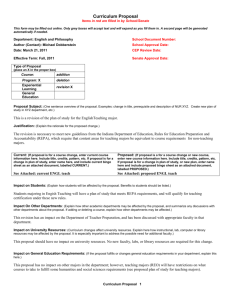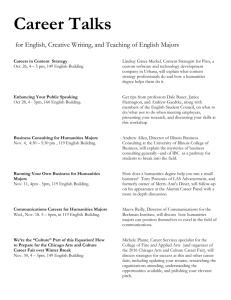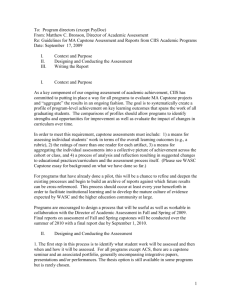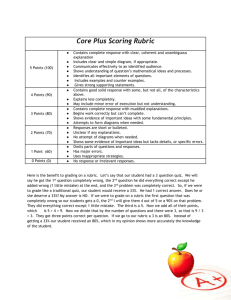2008-09 Annual Report - Coastal Carolina University
advertisement
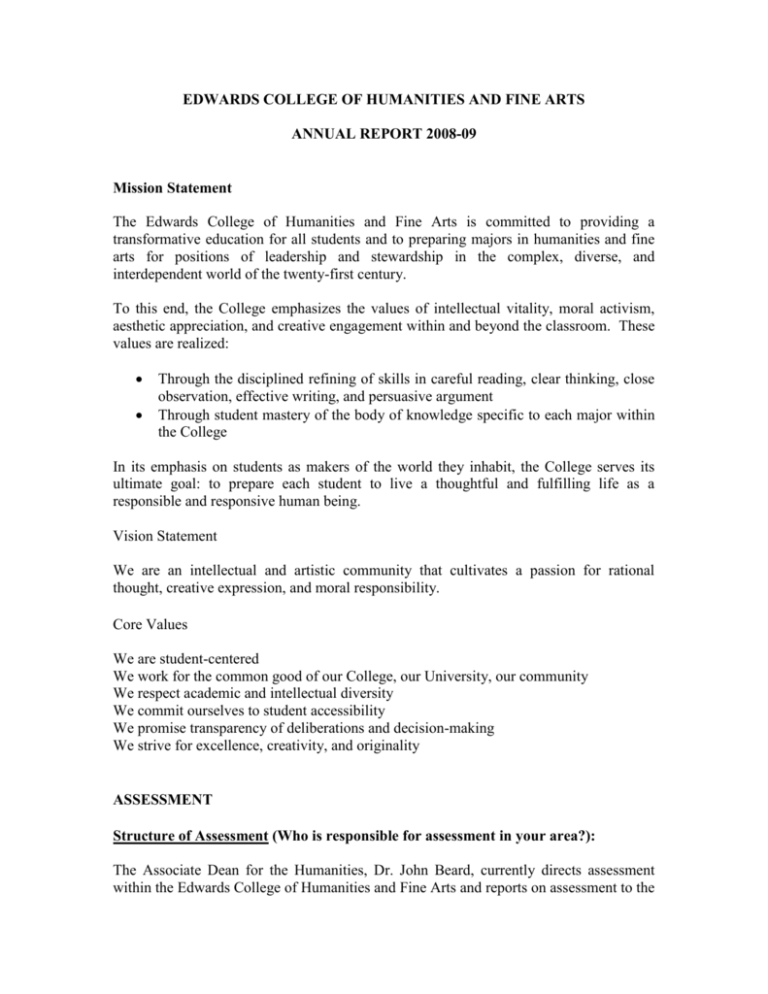
EDWARDS COLLEGE OF HUMANITIES AND FINE ARTS ANNUAL REPORT 2008-09 Mission Statement The Edwards College of Humanities and Fine Arts is committed to providing a transformative education for all students and to preparing majors in humanities and fine arts for positions of leadership and stewardship in the complex, diverse, and interdependent world of the twenty-first century. To this end, the College emphasizes the values of intellectual vitality, moral activism, aesthetic appreciation, and creative engagement within and beyond the classroom. These values are realized: Through the disciplined refining of skills in careful reading, clear thinking, close observation, effective writing, and persuasive argument Through student mastery of the body of knowledge specific to each major within the College In its emphasis on students as makers of the world they inhabit, the College serves its ultimate goal: to prepare each student to live a thoughtful and fulfilling life as a responsible and responsive human being. Vision Statement We are an intellectual and artistic community that cultivates a passion for rational thought, creative expression, and moral responsibility. Core Values We are student-centered We work for the common good of our College, our University, our community We respect academic and intellectual diversity We commit ourselves to student accessibility We promise transparency of deliberations and decision-making We strive for excellence, creativity, and originality ASSESSMENT Structure of Assessment (Who is responsible for assessment in your area?): The Associate Dean for the Humanities, Dr. John Beard, currently directs assessment within the Edwards College of Humanities and Fine Arts and reports on assessment to the Dean. With the logistical support of the College Assessment Coordinator, Paula Vincini, he works directly with the nine Department Chairs to establish clear assessment plans for each academic program, to insure that such plans are followed and that stated assessment tools are used, and to edit the resulting assessment reports from each area, reports that include the explanations of results and use of results for continuous improvement. Within their areas, each Chair is responsible for implementing the departmental assessment, and each has a small committee of interested faculty members who help administer various parts of the assessment plan. Also, a COHFA Assessment Committee made up of representatives from each department in the College and chaired by Dr. Beard meets regularly throughout the academic year to evaluate College assessment plans and results and to make recommendations to the Dean. Identify the strengths you have found as a consequence of the assessment: (1) All departments now have a completed assessment plan for the major and have worked through at least one complete cycle of that plan. (2) All departments now have at least one faculty member other than the Chair who is actively working with the assessment effort of the department. (3) Departments that have been working on assessment a little longer than others or that have had the same fundamental plan for several years (Art, Politics, Spanish, etc.) now have enough data to detect rough patterns. (4) The perception of most majors in our College, as shown by exit interviews, surveys, self-reflective writing and other such affective measures, is very positive. For the most part, they feel that they have learned a lot and had a good experience participating in their majors. (5) According to the various assessment tools now in use, our majors tend to master the basic skills and background information required of their disciplines very well. (6) By the time majors make it to the capstone experience within the major, their skills and knowledge have advanced from where they were three years earlier – sometimes markedly so. (7) Whenever our students are evaluated on their oral presentation of information, they tend to do a little better than when evaluated on a written presentation. Likewise, verbal comprehension seems somewhat higher than reading comprehension. (8) Many of our students tend to perform well in those areas that require or encourage application or performance (performing music, acting, and making art/poetry/posters, but also working at internships or participating in group activities, etc.). They do seem to learn by doing. (9) In exit interviews, graduating students most often comment on specific professors who influenced their success, not on what the program did or did not do. Identify the challenges you have found as a consequence of the assessment: (1) Many departments have encountered difficulty in translating the information they do gather into actual useful data. They tend to produce narratives, not numbers. (2) We are so new to assessment that we currently have only a year’s worth of useful data and/or a very small sample of student responses to use for our assessments. (3) There has been too much reliance on grades in select classes as the only measure of assessment or too much reliance on a single score on an exit exam, etc. Our assessments are not broken out for more detailed and specific analysis. (4) Likewise, we are still in the process of fleshing out our assessment system. Too often, departments show a poor or haphazard assessment process where some partial or unfinished assessments occur. (5) We need to find ways to separate transfer student data from the data connected to our “original” CCU majors. In other words, we need to track student progress more accurately. (6) Evaluating higher order thinking and problem solving skills has proven more difficult, costly and time-consuming than we originally thought. (7) More specifically, as departments have sought ways to engage and assess student writing as a means of assessing critical thinking skills, they have been thwarted by costs – as in the labor cost for employing graders, the cost of rubric creation and implementation, or simply the cost in time of conducting any kind of useful analysis of student writing. (8) The assessment data that is gathered does not usually cause any changes in instruction. Teaching seems more insulated from assessment than it should be. (9) The depth of assessment understanding within any department is somewhat limited. In some departments, it does not penetrate very far at all. What are the changes based on assessment results? Although numerous smaller changes occur throughout the academic year, more substantial changes for 2008-2009 can be grouped into three main categories: (1) Changes in Curriculum Due to Assessment It may take several years of collecting assessment results before any department is prepared to actually change its curriculum in a fundamental way, but some adjustments will occur year by year in response to specific perceived challenges or opportunities. The following examples are typical of these situations: In 2008-09, as a result of assessing the results of the ETS national exam in political thought, the Politics Department began initial steps to revise the major. First, POLI 300 Introduction to Political Theory will be a required course for all political science majors in future years so as to expose these students to a wider range of political thought. Second, in addition to this introductory course, an additional upper-level political thought course will now be required of all majors in order to allow students to be able to focus on an in-depth period of political thought of their choice. The Department of Communication was reasonably satisfied with the results of its first round of assessments in 08-09, but it decided to re-arrange the curriculum in order to enhance student skills in communication research and their understanding of communication theory. Introductions to theory and research were moved to the sophomore level with the creation and implementation of COMM 275 Communication Theory and COMM 276 Communication Research. Likewise, two new capstone courses were also developed in order to offer more diversity of research experiences and a more comprehensive overview of the major, resulting in COMM 491: Communication Capstone – Thesis and COMM 492: Communication Capstone – Project. After two years of portfolio reviews and three years of using THEA 499 Theatre Capstone Project as an assessment tool, the Department of Theatre is prepared to draw some preliminary conclusions. For instance, the department has instituted a plan to accept only students who have auditioned prior to being accepted as majors. This will insure that an ensemble of like-minded students will all have a basic understanding of the art of theatre and all will share a conviction to the training. Likewise, the department will continue to treat all students as if they are training to become professionals and intend to compete on the national and international level. To this end, four new Bachelor of Fine Arts Programs are being offered for review to the S.C. Commission on Higher Education: (1) Acting, (2) Musical Theatre, (3) Design and Technology, and (4) Physical Theatre. (2) Changes in the Classroom Due to Assessment In some cases, the general discussion surrounding assessment will result in a reappraisal of what certain classes within the program accomplish for students or for the major goals of the department. These discussions can result in a change in the emphasis of the teaching in such classes or in the actual assessment used to determine student progress. Due to the fact that HIST 201 History of the United States: Discovery Through Reconstruction acts as a required foundation course for the major and as a selection for meeting Goal #6 of the University Core Curriculum, the Department of History paid particular attention to how it was assessed. Early assessment results demonstrated that the department should consider a cooperative effort among HIST 201 faculty to determine instructional techniques that might elevate student understanding in this content area and perhaps even the construction and application of a common exam devoted solely and explicitly to America’s founding ideology. As a result of the required Sophomore Review, ARTS 297, the Department of Visual Arts determined that the department needed to mount a coordinated effort among all faculty members teaching foundation courses in the major to address targeted skills in the classroom that matched the ones identified on the portfolio rubric used in ARTS 297. Workshops will be scheduled to help remind all faculty teaching foundation-level courses of these targeted art and design skills. Also, there was discussion among faculty about using ARTS 297 as the place to inject computer-imaging skills that will serve them well later on in the program. In the Department of Music, faculty juries are used extensively to evaluate student progress. Most applied music classes are subject to some such level of review. In 2008-09, faculty were asked to review the instrumental area assessment of the jury process, and results showed that the instrumental faculty need to meet and discuss the jury system, especially adjunct faculty involvement. Improvements in the congruence between the rubric, the levels, and student understanding of the results are needed. The faculty will examine the rubric for changes for next year’s assessment. The use of a new evaluation rubric for the vocal division in the 2009-09 year was put to use with great success. Improved consistency in the verbiage of faculty feedback, as well as increased accountability for said components and ensuing rating/grading, was achieved. (3) Changes in the Assessment Process Itself Assessment processes are still relatively new in many departments of the College. Indeed, some assessment tools were used for the first time in 2008-09, so the amount of data is limited, and some tools are still in need of adjustment and revision. Therefore, it is not surprising that another area of change involves the assessment processes themselves. The Department of English uses a portfolio of student work as a major source of information about the major. Samples of various kinds of student writing are collected from a variety of courses, and these samples are included in their portfolios as part of ENGL 411 English Capstone Seminar. Using a rubric created by the department for assessment, the English Assessment Committee then reads and rates the portfolios. Because this is the first year for using the rubric and for collecting portfolios, it is too early to see any trends, and the small sample size precludes making any general conclusions, but it has already been determined that sharing the portfolio rubric with English majors early in their academic career may help improve the results. The Department of Foreign Languages designed and implemented common final exams for the introductory sequence in Spanish: SPAN 110, 120, and 130 during Spring 2009, with the goal of standardizing the assessment of student learning in such courses. This pilot effort went well, so the implementation of common final exams should be in place for 2009-2010, and perhaps the department will approach the Calendar Committee to request that Spanish 100-level final exams be assigned in a block, like ENGL 101 and 102. A comprehensive exit exam has been used to help assess graduates in the Department of Philosophy and Religious Studies for several years, but a review of that tool during 2008-09 has resulted in some changes. (1) For some areas, additional assignments will be assessed within certain classes in the form of a quiz or examination, as well as a paper or essay examination, both of which will be graded by a rubric. (2) The exit exam itself will be revised into one set of identification-based questions and another set that is understanding-based. (3) Instructor specific versions of the exam will be developed so that the different emphases in the various sections of the course can be reflected in the exam. New Projects and Initiatives The Department of Communication worked to create and oversee the new student radio station, WCCU, and to design the new broadcast communication laboratory in the Foundation Center. The English Department developed a new Master of Arts in Writing program that was approved and that will be implemented in fall of 2010. The Department of Visual Arts created a new major in Graphic Design that was approved and that will be implemented in spring 2010. The Department of Theatre created a new BFA in Musical Theatre that was approved and that will be implemented in fall 2010. Faculty created or modified more than one hundred separate courses. The department of Foreign Languages created new courses in Spanish with special emphasis on health care and business. The Department of English implemented a new summer program at Oxford University in the UK. Grants and Other Externally-Funded Activities Faculty received dozens of internal and external grants with some of the most prestigious being listed below: Dr. Roy Talbert received a $25,000 grant to write the history of the Georgetown Baptist Church as part of its three-hundredth anniversary celeabrations. Dr. Miglena Ivanova received a grant from the ASIANetwork to supervise research projects of three students in Japan in summer 2009. Dr Carol Osborne received a Fulbright-Hays award to study history and culture in China in summer 2009. Dr. Pam Martin received a Fulbright Scholar Award for Ecuador for spring 2009. Scholarly and Creative Accomplishments Faculty published more than one hundred individual scholarly works (articles, book reviews, essays, poems, works of fiction) during the academic year. Faculty made more than two hundred separate scholarly presentations and collaborated in hundreds of separate performances or exhibitions on and off campus, within the US and abroad. Some of the most prestigious contributions are listed below: Dr. Kenneth Townsend’s book, South Carolina (On the Road Histories Series) was published by Interlink in 2008. Dr. Vernon Burton’s book, The Essential Lincoln: Speeches and Correspondence was published by Hill and Wang in 2009. The third edition of Dr. Nils Rauhut’s Ultimate Questions: Thinking about Philosophy was published by Prentice Hall, along with the accompanying Readings on the Ultimate Questions. Community Engagement and Outreach Activities Faculty made hundreds of individual contributions of service to the University, and almost two dozen to the community. Faculty from the College served on a large number of professional and community boards, committees, and task forces (including service to the Burroughs and Chapin Art Museum, the Conway Medical Center, and numerous other organizations. Faculty served on a wide variety of professional journal editorial boards and as officers of disciplinary professional organizations. Edwards College faculty spoke or performed at CCU’s Litchfield facility as part of the eight-week Board of Visitors community lecture series. Members of the English Department collaborated with the Burroughs and Chapin Art Museum on a speakers’ series, delivering a number of presentations themselves. The English Department’s “Words to Say It” series brought a diverse group of nine writers to speak on campus and to the wider community. Faculty were actively involved in developing the Freewoods Farm living history site in Horry County Awards and Honors Faculty members received numerous teaching, advising, and scholarly/creative awards. Some highlights include the following: Professor Steve Hamelman received the HTC Distinguished Teacher-Scholar award Professor Dan Albergotti received a Pushcart Prize Dr. Wink Prince was elected president of the South Carolina Historical Society Dr. Vernon Burton was elected president of the Southern Historical Association Dr. Nils Rauhut served as Vice President and President-Elect of the American Association of Philosophy Teachers. Dr. Dennis Earl was elected president of the South Carolina Society for Philosophy.
